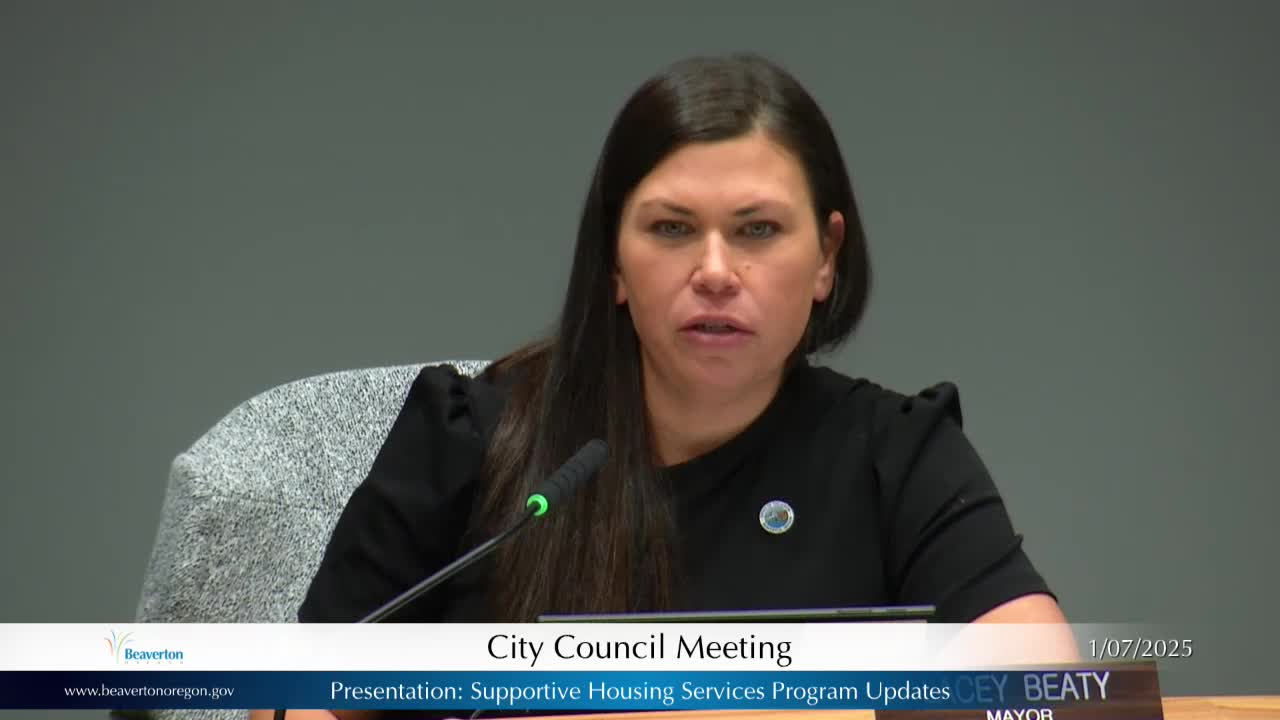Metro seeks input on extending Supportive Housing Services; Beaverton councilors raise timing and oversight concerns
Get AI-powered insights, summaries, and transcripts
Subscribe
Summary
Metro officials presented options to extend the Supportive Housing Services (SHS) program past its 2030 end date and to add affordable housing funding, while Beaverton elected officials urged caution, clearer oversight and city protections before any ballot referral.
Metro officials briefed the Beaverton City Council on possible changes to the region's Supportive Housing Services (SHS) program, including proposals to extend the tax beyond 2030, add affordable and permanent supportive housing as eligible uses and simplify the program's governance. Councilors cautioned Metro to address predictability, city funding needs and oversight before seeking voter approval of any extension.
Metro Councilor Garrett Rosenthal and Metro Councilor Juan Carlos Gonzales opened the presentation, and Andy Shaw, Metro's director of government affairs, outlined staff and stakeholder work since the Metro Council asked staff to explore options. Metro said SHS has funded more than 1,800 shelter beds regionwide, housed more than 6,000 people and supported more than 15,000 eviction-prevention interventions. Metro described an emerging proposal that would extend SHS to 2050 (roughly a 20-year extension), add housing as an eligible use, include cities as implementation partners, and create a single oversight body to replace the current multiple committees.
Metro staff said the program currently raises substantially more than initial projections; early estimates assumed about $250 million per year, while recent revenue has been north of $350 million and is projected in scenarios between $250 million and $425 million annually. Metro also said there was approximately $400 million in carryover early in the program and that counties have directed much of those funds to programs and one-time expenses. Metro staff described polling that shows public support improves when the extension is paired with governance reforms and accountability measures; they said a narrow poll question on just extending the tax alone polls below 50%, while a package of reforms can move support into the high 50s to low 60s.
Councilors told Metro they support stabilizing county funding and ensuring cities are "made whole" for operational costs cities incur addressing homelessness. Councilor Hartmeyer Prigg said Beaverton has invested general-fund dollars for cleanup, library monitors and policing and warned that reducing the tax rate or reallocating core county funds before city and county baseline needs are met could leave cities short. Councilor Teeter said the council needs more clarity on projected expenses and governance details before supporting a ballot referral as soon as May; Councilor Tipton and others said May is a short timeline for a major change.
Business and provider perspectives also surfaced in public comment. Alicia Burmes, CEO of the Beaverton Area Chamber of Commerce, said the chamber does not support extending the SHS tax to 2050 and urged more study before taking the question to voters. JC Sabala of Home Plate Youth Services opposed a proposed tax cut tied to some extension proposals and warned that reducing revenue would threaten youth services the organization provides.
Metro officials said discussions are ongoing, that some county chairs and county staffs have submitted proposals with broad agreement on many elements, and that work sessions and a potential referral timeline are under consideration: Metro has scheduled work sessions in mid- and late-January and is exploring an early February referral to the ballot for a possible May election, while acknowledging timing and details remain unsettled. Councilors asked Metro to continue direct engagement with cities on governance structure, predictability for county funding, allowable uses and local impacts.
